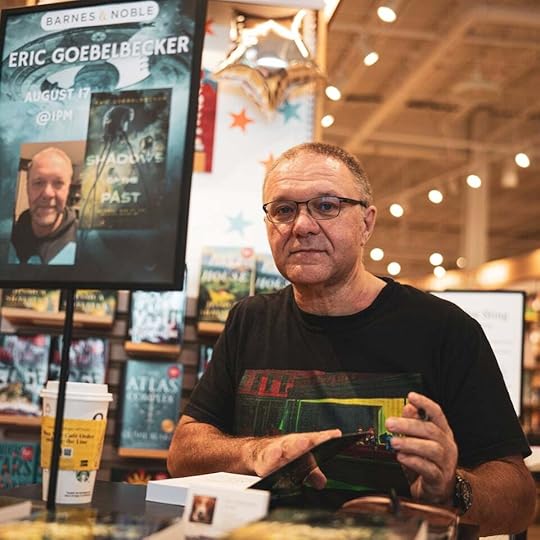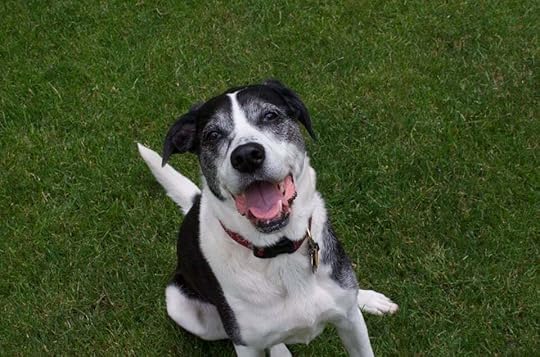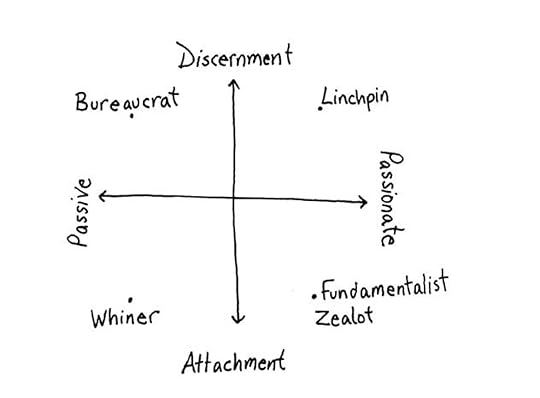Eric Goebelbecker's Blog, page 2
September 22, 2024
Monday, September 23, 2024. Afternoon

I have fond memories of reading and rereading and rereading The Cricket in Time Square as a kid. I’m pretty sure I was around nine-years-old the first time I got the book from the library, right after a TV special starring Mel Blanc aired on TV.
So, when it showed up as available on Paperbackswap.com, I jumped on it.
I finished it today, and it did not disappoint. It’s a charming story about a cricket that accidentally gets on a train to New York City and finds himself stranded in Time Square. It’s set in the late 50’s/early 60s and hearkens back to a time when people still listen to the radio, buy newspapers and read magazines. So, what was once a children’s book nownserves more as a period piece. it also has some absolutely adorable pictures, one for each chapter.
The author write several sequels, but I’m not sure if I want to read then. This book feels like lightning in a bottle to me.
September 13, 2024
Saturday, September 14, 2024. Evening
Testing title in rss feeds. Does adding an H1 fix it?
Saturday, September 14, 2024. Evening.
Testing title in rss feeds. Does adding an H1 fix it?
August 25, 2024
New Store, Interviews, Welcome New Subscribers
Hi,
I’m breaking out of my once-a-month-cadence for the second time in two months for some news and because there may not be a September newsletter due to travel.
First of all, welcome new readers! I really appreciate you signing up, and hope you’ll hang around with us for a bit.
The Barnes and Noble signing was a great success and I sold many more books than I ever dreamed I would. The author trying to look insightful, but thinking about well a scone would go with that coffee.
The author trying to look insightful, but thinking about well a scone would go with that coffee.
I finally set up a store to sell ebooks direct. You can find it here. I'll also be setting up paperbacks very soon, after I make sure I have the ability to get them shipped that makes sense for everyone.
InterviewsA smart man would have podcast interviews set up before, or at least soon after he releases, his first book. I am not that man.
I was a guest on The Blaster and Blades Podcast last week. This podcast is a lot of fun since they tend to talk about anything and everything science fiction and fantasy. My interview was no exception.
I also sat for an interview for Morgen Bailey's Create Writing Academy where we talked about writing, creativity, and process. That link takes you to a bunch of interviews that you may find informative, especially if you're a writer yourself.
August 10, 2024
B&N Signing, Dogs and Writing, Counting Crows
Hi,
I haven’t posted two weeks back to back in a while, but I have some news and links to share, and didn’t want to make last week’s message too long.
Barnes and Noble SigningIf you live near Paramus, New Jersey, I’ll be signing copies of Shadows of the Past at the Route 17 store next Saturday, the 17th. Here’s a link with details. If you’re in the area and want to drop in and say hello, I’d love to meet you.
Dog Training and Writing
My guest appearance on the Story Magic podcast hit the series of tubes we call the Internet this week. In it I talk about dog training and writing. They have more in common than you think!
About twenty years ago my wife and I adopted a demon puppy that literally made me become a dog trainer. I apprenticed at a local dog training school and eventually ended up running my own dog training business for a few years until the hideous real estate market in this area made it impossible to grow it into a full time endeavor.
 Caffeine, well after she stopped being a demon puppy.
Caffeine, well after she stopped being a demon puppy.Dog training, if you’re doing it right, is about learning theory. You need to understand how the dogs learn so you can teach them how you want to behave. But here’s the rub: dogs learn the same way we do, and once you understand how that works, you can’t unsee it. It effects how you look at nearly everything.
My part-time dog training has had a few fits and starts over the past few years, but it looks like I may be about to go back to regular training one or two evenings a week in the fall.
Counting Crows (no, that those guys)Back when I started attending classes and seminars about animal behavior, there were still plenty of people that would tell you that only humans use tools (despite Jane Goodall documenting chimps using sticks to eat termites in the late 1950s), count, or demonstrate altruistic behavior.
 Crows have been documented counting, but not sporting dreadlock extensions.
Crows have been documented counting, but not sporting dreadlock extensions.We’ve come a long way in twenty years. Birds, elephants, octopi, dolphins, and other animals have been documented using tools and several species have been shown to demonstrate altruism, even as skeptics argue over what the term really means. Whales appear to have some form of phonetic language, or at least a way to address messages to individual members of their pod.
Now, we have research pointing to counting by crows.
Free Ebooks!Another thing I haven’t done in a while is share some free ebooks! Take a look at these latest specials!

I’m part of a fantastic science fiction and fantasy giveaway this month! You’ll find a huge selection of free books over here.
August 3, 2024
Preview from Clouds in the Future, Book Signing, Download Fix
I hope you're having a great summer!
This time I have the preview chapter from Clouds in the Future I promised.
But first, some housekeeping.
It seems that a few new subscribers (Welcome, by the way!) had problems downloading The Tesla Fire. So, here’s a link to download it without having to sign up again.
Second, I’ll be signing books at Barnes and Noble in Paramus, NJ on Saturday, August 17th! I’d love to meet you if you can make it. Here’s the announcement and details on the store if you’re not already familiar with the area.
On to the preview.
And if you haven’t read the first book in The great War of the Worlds series yet, you can get your copy of Shadows of the Past here.
You can preorder Clouds in the Future here.
Clouds in the FutureChapter 1Goussainville, France
The little girl danced on the edge of the well, teetering on the edge and waving her arms to catch her balance. Christian Beckenbauer lunged toward her with his hands outstretched, then caught himself when her father grabbed and pulled her back.
It was easy to understand the girl’s exuberance. Her tiny fingers clutched what was probably the first piece of bread she’d seen in two weeks; the last time Christian and the rest of the Marauders had visited with supplies from Paris. But seeing her close to falling in the well brought back unwelcome memories.
The tiny village of Goussainville sat on the northeastern edge of the area surrounding Paris. An area that the Martians had left unmolested after withdrawing a few weeks earlier, but not before destroying rail service and decimating crops. Food was still in short supply and what was still available had to be distributed by foot, truck, or horse-drawn cart.
“Herr Beckenbauer?”
It was Louis, the man who oversaw handing out food to the townspeople. He was younger than Christian, probably only twenty-two or three, with clothes that hung off him like an under stuffed scarecrow. Clearly, he’d been eating better before the invasion. Louis inherited the village market from his father, who’d been killed by the invaders in January when they’d torn through the area, making him the closest thing to a mayor the village had.
“Yes, Louis?” Christian replied.
“What should we do with these Bibles?” the younger man asked, pointing to a crate perched on the end of one of the supply carts.
Christian looked around before answering. The monseigneur was nowhere in sight.
“Set them aside for when it gets cold again. They’ll make great kindling.”
“Now, now, I’m sure Louis can find another use for the Cardinal’s generous gift,” Emil Zimmerman said with a smile that didn’t quite reach his eyes. “They’re for everyone. Why don’t you get the monseigneur and see if he has a plan for distributing them? He’s taking confession at the église.”
Louis nodded and left.
“We talked about this, Christian. You need to keep your feelings about the church to yourself. We need them,” Emil said after Louis was out of earshot. Emil was a small man, noticeably shorter than Christian’s two meters, with thinning, dark hair. What he lacked in stature, he made up for in gravitas and intensity.
“We’re already keeping these villages safe and delivering food to them. Why do we have to distribute the church’s trash and kiss up to the Cardinal’s men, too? And where’s the monseigneur? He can hand out his books.”
“He’s taking confession. The Martians killed their priest. We need to work with him because that’s part of the deal, and we don’t want to make any more trouble for the Resistance. Things are tenuous enough as it is,” Emil said.
“They’re tenuous because of the Cardinal’s attitude toward the us and the Resistance.” Christian said.
“Yes, he’s got a problem with Curie. We don’t want him to have a problem with—”
A deep hum cut off Emil’s point. A hum that almost sounded like a Martian heat ray.
Fortunately, most of the townspeople had already picked up their supplies, and only a few were still in town square. Even so the area exploded into pandemonium, with people running, screaming, and surging toward cover where they could find it. Emil and Christian ran to the shelter of a nearby building.
“Martians? Where?” Emil asked, scanning the horizon. “I don’t see any Wanderers.”
“Is it me, or did that heat ray sound… wrong?” Christian asked.
“No, it’s not you. Wrong pitch,” Emil said with a nod.
The tone was too high, almost as if it was from a smaller unit. Were the Martians deploying less sizeable wanderers, or some kind of more compact craft?
Christian craned his neck and listened. Shots rang out from the northern end of the village, followed by another hum.
Emil had posted men at the end of the town because that was where he expected any ravageur attacks to come from. Were they wasting rounds on a wanderer? They knew better than that.
Zimmerman had led the squad that formed the heart of the Marauders safely out of the trenches of the Somme during a deadly Martian attack and all the way to Reims, where they toppled a wannabe military dictator and defended the city from even greater Martian aggression. Then they earned their nickname by staging a series of hit and run attacks on the Martians as they made their way to Paris, where they had heard the Resistance needed help. Emil was a natural, if sometimes reluctant, leader.
“Go see what’s happening over there. I’ll check the southern end of town to make sure they aren’t trying to box the village in,” Emil said.
“Send the panzer our way after you’re sure,” Christian said. The Marauders had their Martian-powered electric panzer, outfitted with a heat ray, with them on this trip.
“We need a prisoner, especially if the ravageurs have Martian tech now. I’ll give you some time before I send Fluse. You’re our best shot. See if you can get one of them before they run,” Emil said and took off to the south.
The label “ravageurs” suited the mysterious and anonymous attackers. They’d appear, open fire on villages, pilfer supplies, and retreat, often within minutes. Other than an uncanny ability to get away unscathed, they demonstrated no strategy or underlying goal.
But if they had heat rays now, their strategy might change.
Christian worked his way north, taking cover between the buildings that lined the tiny village’s main road as he went. Soon the familiar scent of a wood fire filled the air, confirming his suspicion that someone was using a heat ray. But most of the structures in Goussainville were stone. What was burning?
The main road ended with a two-story brick building, where several marauders huddled for cover. Two of them were watching the field that lie past the edge of town through their rifle sights. A burn was completely engulfed in flames that way.
“What’s happening?” he asked the big farm boy Emil affectionately called “Bumpkin.” Bumpkin was a tall, blonde, farm boy from somewhere deep in Bayern with an endearing, almost childish, naivete.
Bumpkin pointed toward the open field, his eyes wide with fear. Christian squinted for a better view through the smoke and finally saw the strangest vehicle he’d ever seen. Someone had done their best to outfit an automobile like a panzer, but their best wasn’t very good. Someone had attached metal plates, obviously salvaged from scrap to it as armor, with irregular gaps on the front and sides, presumably so the driver could see, and a crew could aim weapons. But what might have been hilariously inept under other circumstances wasn’t funny at all. The makeshift battle wagon had a heat ray bolted on its roof.
“We were over by the barn when that thing came out of the woods,” Bumpkin said, his voice quavering. “It got Frenz.”
Before Christian could answer, the heat ray sounded and fired on the building across the road from where the men hid. It was built from rough cast walls but had wood-framed windows which immediately burst into flame.
Christian watched in shock as a woman fled out the front door and the vehicle turned the heart ray on her. She was incinerated in seconds.
The ray might have a higher pitch, but it was at least as deadly as the ones on the wanderers.
“We have to stop that thing before it kills everyone in Goussainville,” said Miller. Miller was the metropolitan answer to Bumpkin. Tall, blonde, and muscular but a born cynic that was fastidious about his uniform.
“We need Fluse up here, but I don’t know how much that thing will do before he makes it here,” Christian said.
“Can you shoot the mirror?” Miller asked. “Like Zimmerman did back on the Somme. I can’t make a shot like that, but I know you can.”
Of course! That’s how Emil had disabled the heat ray the madman was using after they’d fled the trenches. One well-placed shot, and this makeshift panzer was nothing more than a slow-moving automobile.
Christian eased himself into a prone firing position and brought his rifle sight up to his eye. He sighted the mirror and prepared to fire. Before he squeezed the trigger, the heat ray fired again, forcing him to look away.
Another person had exited the bakery and was burning on the road in front of it.
Bile rose in Christian’s throat. He sighted the crack in the armor and put three rounds into it, hoping with every fiber of his being that he had killed everyone in the vehicle. So much for Emil’s prisoners. These butchers were using Martian tech on civilians and belonged in hell.
Then he targeted the mirror and shattered it with another shot.
Seconds after the mirror exploded into glass shards, Christian heard the rumble of the panzer. It rolled over to where he waited with Bumpkin. The huge steel vehicle spun on its tracks to face away from the enemy, and Leutnant Fluse stepped out.
If the Marauders were a proper German unit, Fluse would have been their commander. Of course, if they were still German military, they’d be back in Germany instead of delivering supplies from Paris to French villages.
Fluse and Emil had been at each other’s throats back at the Somme and had struggled for control of the group all the way to Reims. Fluse, like his close friend Miller, looked and acted like the Kaiser’s ideal soldier. Emil had been, in many ways, the complete opposite. But they’d worked things out at some point during the struggle with the erstwhile strongman Wegener and Emil was in charge.
“I think it’s disabled,“ Christian said. “But maybe you should lead us over there and we can make sure.”
Fluse reentered the panzer, closing the door behind himself. Christian fell in behind the vehicle with Bumpkin and they headed across the field. The men used the vehicle as cover in a drill that they practiced many times before.
There were two dead men inside the vehicle.
“No prisoner?” Emil said with a sigh.
Christian shook his head and explained what happened.
“Why didn’t you just shoot the mirror out?” Emil said, his head titled in puzzlement.
“They were butchers,” Christian spat.
“Butchers that could have told us where they got those weapons from,” Emil said.
The monseigneur stood behind Emil with his arms crossed, shaking his head. He was a heavyset man in his late twenties who, even though he was a man of the cloth, was fastidious about his grooming. His clean shaven cheeks gleamed in the midday sun.
Heat rose in Christian face and a bead of sweat trickled onto his nose.
“They had to be stopped. Who knows what they would have done if—” he said before Emil cut him off.
“These weapons are our only advantage, and now someone else has them, too. We need to know more. Try to control your temper next time,” Emil said with a grimace.
“We need to get more men trained so we can start creating garrisons. And we need Grundig to build us more weapons,” he continued.
“I think you’d have to talk to the Cardinal before you start deploying an army around here,” said the monseigneur in heavily accented German.
“Is he interested in protecting these people, or trying to restore the Holy Roman Empire? The Cardinal isn’t in charge of troop movements,” snapped Christian.
“Maybe if he was, you’d know who these ravageurs were and what they wanted!” the monseigneur exclaimed.
“Oh really? Why doesn’t he burn some incense and ask God?” Christian said with a sneer.
“That’s enough,” Emil said. “Let’s get back to Paris before sunset.”
July 16, 2024
Linchpin
Someone reached out to me about a post from my old website that didn’t make it over here.
While I’m not thrilled with the quality of my writing twenty years ago, it’s a topic we should all revisit from time to time so, here it is:I just finished Seth Godin’s Book Linchpin: Are You Indispensable? It’s a book that I will need to read at least two more times to fully digest. It’s also a book I think everyone should read.
If you haven’t heard of Seth Godin, look here. I’m not even going to try to cover his accomplishments in a blog post that I already know is going to be longer than I want. His blog is worth subscribing to, regardless of what you do or who you are. (You can get it delivered right to your inbox.)
The title of this book implies that it’s about being an indispensable something, and since the book is often found in the Business and Self Help categories, you might assume that the book is about being an indispensable employee, entrepreneur, or business owner. You’d be right, but you would also only be scraping the surface. Godin’s definition of a Linchpin is someone who creates art. He then defines art as a gift that is intended to create change.
If this sounds like a broad definition, that’s because it’s intended to be one. A lot of Linchpin: Are You Indispensable? is about what techie types like me refer to as “soft-skills” and how, when viewed with Godin’s definition of art, those skills finally seem as important as they really are. Art might be creating what we “traditionally” think of as art, such as painting, writing, or film. But it can also be creating something something more “technical” like software. Or it can be as simple as making life better for someone.
The graph below, which I adapted from Godin’s hand draw version in the book, is a great example of what the book has to offer.
 The Linchpin Scale
The Linchpin Scale
On the horizontal access we have a measure of passion. How much effort are you willing to put into your art? What sort of obstacles are you willing to overcome?
On the vertical access we have a measure of attachment. Attachment can mean attached to a set of rules, a specific outcome, or a specific solution. I was tempted to change this axis to neasure “flexibility,” but decided to stick with Seth Godin’s definitions. It’s his book.
On the lower left hand side we have the Whiner. The Whiner is attached to his world view and to how he thinks it should be, but he’s stuck since he has no passion — he lacks a willingness to create any change. The battle cry of the Whiner is “It’s not fair!”
On the lower right hand side we have the Fundamentalist. Regardless of what community you are in the Fundamentalists are easy to find and probably well known. Combine a rigid attachment with a lot of passion and noise is always part of the result. Often the only result. Unfortunately (or maybe fortunately?) not a lot of change is likely, since that rigid attachment almost always precludes even talking to someone with a different view, let only working together to make something happen.
The upper left hand corner is interesting. What happens when you combine a lack of passion with a lack of attachment? You get a Bureaucrat. When in doubt, fall back on rules and “It’s not my decision/fault/problem.” You know where to find them.
The upper right hand side is the home of the Linchpin: a passion to affect change combined with an ability to discern what a successful outcome can look like. Where the fundamentalist is focused on a rigid definition of success, the Linchpin is looking at what some might call the “big picture.” A desire to make things happen, combined with an ability to adapt is a recipe for results.
Where are you on this graph? Is your position always the same for every situation you are in? I know I tend to shift around, but now that I have it for a frame of reference, I think it will improve my ability to get things done.
This is a lot to try to cover in 500 words, and I am already well over that. Linchpin: Are You Indispensable? is worth your time and your money. If audio is your thing, there’s an edition read by Seth himself.Time to reread that book.
linchpin
Someone reached out to me about a post from my old website that didn’t make it over here.
While I’m not thrilled with the quality of my writing twenty years ago, it’s a topic we should all revisit fro time to time so, here it is:I just finished Seth Godin’s Book Linchpin: Are You Indispensable? It’s a book that I will need to read at least two more times to fully digest. It’s also a book I think everyone should read.
If you haven’t heard of Seth Godin, look here. I’m not even going to try to cover his accomplishments in a blog post that I already know is going to be longer than I want. His blog is worth subscribing to, regardless of what you do or who you are. (You can get it delivered right to your inbox.)
The title of this book implies that it’s about being an indispensable something, and since the book is often found in the Business and Self Help categories, you might assume that the book is about being an indispensable employee, entrepreneur, or business owner. You’d be right, but you would also only be scraping the surface. Godin’s definition of a Linchpin is someone who creates art. He then defines art as a gift that is intended to create change.
If this sounds like a broad definition, that’s because it’s intended to be one. A lot of Linchpin: Are You Indispensable? is about what techie types like me refer to as “soft-skills” and how, when viewed with Godin’s definition of art, those skills finally seem as important as they really are. Art might be creating what we “traditionally” think of as art, such as painting, writing, or film. But it can also be creating something something more “technical” like software. Or it can be as simple as making life better for someone.
The graph below, which I adapted from Godin’s hand draw version in the book, is a great example of what the book has to offer.
 The Linchpin Scale
The Linchpin Scale
On the horizontal access we have a measure of passion. How much effort are you willing to put into your art? What sort of obstacles are you willing to overcome?
On the vertical access we have a measure of attachment. Attachment can mean attached to a set of rules, a specific outcome, or a specific solution. I was tempted to change this axis to neasure “flexibility,” but decided to stick with Seth Godin’s definitions. It’s his book.
On the lower left hand side we have the Whiner. The Whiner is attached to his world view and to how he thinks it should be, but he’s stuck since he has no passion — he lacks a willingness to create any change. The battle cry of the Whiner is “It’s not fair!”
On the lower right hand side we have the Fundamentalist. Regardless of what community you are in the Fundamentalists are easy to find and probably well known. Combine a rigid attachment with a lot of passion and noise is always part of the result. Often the only result. Unfortunately (or maybe fortunately?) not a lot of change is likely, since that rigid attachment almost always precludes even talking to someone with a different view, let only working together to make something happen.
The upper left hand corner is interesting. What happens when you combine a lack of passion with a lack of attachment? You get a Bureaucrat. When in doubt, fall back on rules and “It’s not my decision/fault/problem.” You know where to find them.
The upper right hand side is the home of the Linchpin: a passion to affect change combined with an ability to discern what a successful outcome can look like. Where the fundamentalist is focused on a rigid definition of success, the Linchpin is looking at what some might call the “big picture.” A desire to make things happen, combined with an ability to adapt is a recipe for results.
Where are you on this graph? Is your position always the same for every situation you are in? I know I tend to shift around, but now that I have it for a frame of reference, I think it will improve my ability to get things done.
This is a lot to try to cover in 500 words, and I am already well over that. Linchpin: Are You Indispensable? is worth your time and your money. If audio is your thing, there’s an edition read by Seth himself.Time to reread that book.
July 13, 2024
July Update
Last month I said I wanted to send you a chapter from Clouds in the Future in July, but that’s going to have to wait. Last week I read what I had and decided that it needs work. Work that touches nearly every chapter I’d written so far.
Much of this decision came from reading the novel Dark Matter by Blake Crouch. After I wrote about the AppleTV series last month I picked up the book and read it in just over a day. Not because it's particularly short, but because it was one of the most compelling and addictive novels I've read in a long time.
I want to write like that.
I found a few interviews with Crouch, and he talks about how many of his influences are thrillers written by authors like Michael Crichton, Pat Conroy, and Thomas Harris. He also described what he tries to write as "big questions tied to a breakneck pace."
So, I'm revisiting my outline and my individual scenes with that in mind.
Sleeping InOne of the reasons this email arrived in your inbox later than normal is that I slept in today. That, according to science, is a bad thing.
They tested fitness on a graded wheel running protocol, assessed blood glucose tolerance, and measured muscle genetic clock mitochondrial functioning before and after a six-week intervention. The mice in the sleep-in group had impaired physical fitness, glucose handling, and body weight regulation.
Hmmmm. Maybe this is one of the times where I retort with "But I'm not a mouse!"
That's it for this edition. I have writing to do, and it's a safe bet you like short emails.
Have a great summer!
Talk to you in August.
July 11, 2024
July 12 2024
Good morning!
Kottke shared this yesterday. Very apropos.
Turkish proverbThe forest was shrinking, but the trees kept voting for the axe; for the axe was clever and convinced the trees that because his handle was made of wood, he was one of them.
I also rediscovered Coffitivity this week. Fantastic productivity tool, for me at least.
Have a great weekend.




